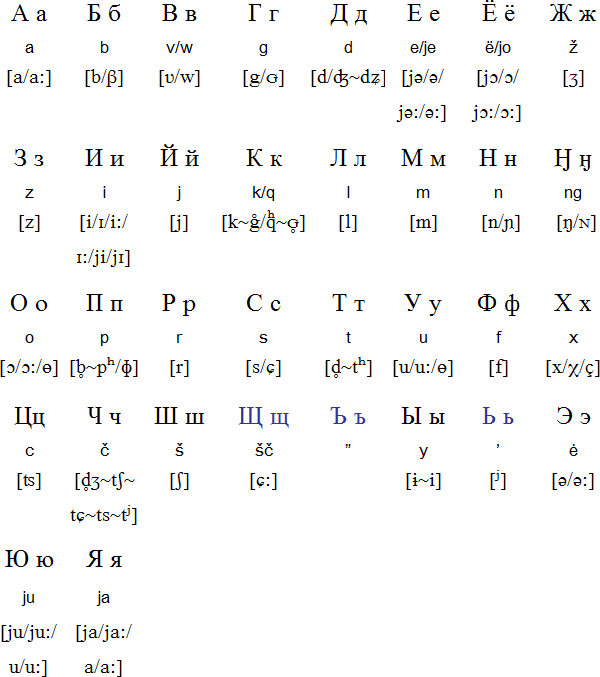Nanai belongs to the Southern (Amur, or Nanai) branch of the Manchu-Tungus languages. It is spoken by about 5,000 speakers in Siberia, specifically in the Khabarovsk and Primorye territories, and in the Poronay district of the Sakhalin region of the Russia Federation. A slightly different dialect, known as Hezhen (赫哲语), is spoken along the Amur River in the North Eastern Chinese province of Heilongjiang (黑龙江).
Nanai was first written in the 1930s with a version of the Latin alphabet. Since 1937 it has been written with the version of the Cyrillic alphabet shown below.

Information on pronunciation compiled by Wolfram Siegel
Source: The Gospel of Luke in Nanai language, Institute for Bible Translation, Moscow 2002
Information about Nanai | Numbers in Nanai
Information about the Nanai language
http://www.tooyoo.l.u-tokyo.ac.jp/Russia/bibl/Nanai.html
http://www.ethnologue.com/14/show_language.asp?code=GLD
Information about the Nanai people
http://www.eki.ee/books/redbook/nanais.shtml
http://en.wikipedia.org/wiki/Nanai
http://pandora.cii.wwu.edu/vajda/ea210/maritime.htm
http://www.narodru.ru/peoples1247.html (in Russian)
Even, Evenki, Jurchen, Kili, Manchu, Nanai, Negidal, Oroch, Orok / Uilta, Oroqen, Udege Ulch, Xibe
Abaza, Abkhaz, Adyghe, Aghul, Akhvakh, Akkala Sámi, Aleut, Altay, Alyutor, Andi, Archi, Assyrian / Neo-Assyrian, Avar, Azeri, Bagvalal, Balkar, Bashkir, Belarusian, Bezhta, Bosnian, Botlikh, Budukh, Bulgarian, Buryat, Chamalal, Chechen, Chelkan, Chukchi, Chulym, Chuvash, Crimean Tatar, Dargwa, Daur, Dolgan, Dungan, Enets, Erzya, Even, Evenki, Gagauz, Godoberi, Hinukh, Hunzib, Ingush, Interslavic, Itelmen, Juhuri, Kabardian, Kaitag, Kalderash Romani, Kalmyk, Karaim, Karakalpak, Karata, Karelian, Kazakh, Ket, Khakas, Khanty, Khinalug, Khorasani Turkic, Khwarshi, Kildin Sámi, Kili, Komi, Koryak, Krymchak, Kryts, Kubachi, Kumandy, Kumyk, Kurdish, Kyrgyz, Lak, Lezgi, Lingua Franca Nova, Lithuanian, Ludic, Macedonian, Mansi, Mari, Moksha, Moldovan, Mongolian, Montenegrin, Nanai, Negidal, Nenets, Nganasan, Nivkh, Nogai, Old Church Slavonic, Oroch, Orok, Ossetian, Pontic Greek, Romanian, Rushani, Russian, Rusyn, Rutul, Selkup, Serbian, Shor, Shughni, Siberian Tatar, Sirenik, Slovio, Soyot, Tabassaran, Tajik, Talysh, Tat, Tatar, Teleut, Ter Sámi, Tindi, Tofa, Tsakhur, Tsez, Turkmen, Tuvan, Ubykh, Udege, Udi, Udmurt, Ukrainian, Ulch, Urum, Uyghur, Uzbek, Veps, Votic, Wakhi, West Polesian, Xibe, Yaghnobi, Yakut, Yazghulami, Yukaghir (Northern / Tundra), Yukaghir (Southern / Kolyma), Yupik (Central Siberian)
Languages written with the Latin alphabet
Page last modified: 07.08.24
[top]
You can support this site by Buying Me A Coffee, and if you like what you see on this page, you can use the buttons below to share it with people you know.

If you like this site and find it useful, you can support it by making a donation via PayPal or Patreon, or by contributing in other ways. Omniglot is how I make my living.
Note: all links on this site to Amazon.com, Amazon.co.uk
and Amazon.fr
are affiliate links. This means I earn a commission if you click on any of them and buy something. So by clicking on these links you can help to support this site.
[top]